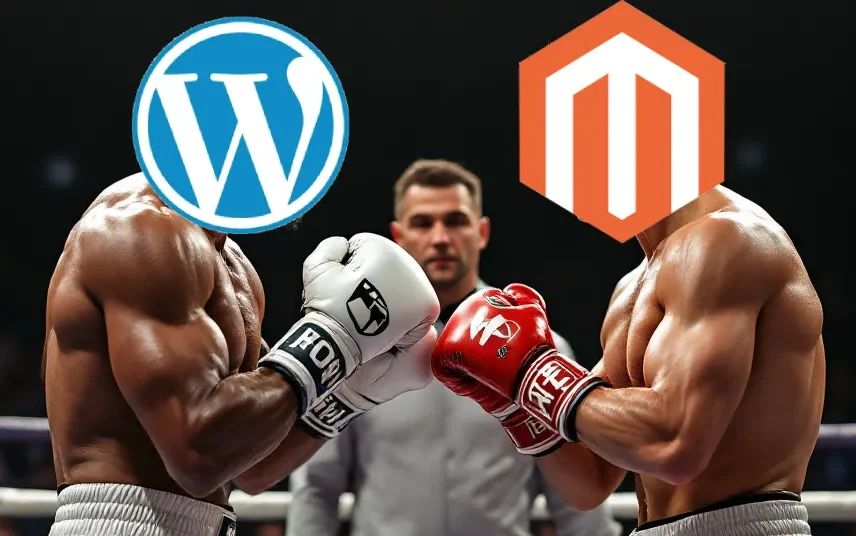WordPress vs Magento – Which is better?

The Evolution of Website Creation and Content Management Systems
The advancement in website creation and content management systems (CMS) has reached unprecedented levels, offering a plethora of tools and platforms to choose from. This abundance can make it challenging to determine the best option for your needs.
Magento vs. WordPress: Two Giants in the CMS Space
Both Magento and WordPress are leading platforms in the CMS arena, each with its unique strengths. They are highly regarded for building blogs and eCommerce sites, but choosing between them depends on your goals, expertise, and what you aim to achieve.
What Is WordPress?
WordPress began in 2003 as a user-friendly blogging platform and has since evolved to become one of the most popular CMS platforms. According to W3Techs (2021), WordPress powers 39.6% of the entire internet.
Key Features of WordPress:
- Flexibility and Intuitiveness: WordPress allows for easy integration of plugins and tools to customise your website.
- User-Friendly: Ideal for beginners due to its straightforward approach.
- Scalability: Can be scaled from a basic version to more advanced features.
- eCommerce Capabilities: Through plugins like WooCommerce, WordPress can support eCommerce functionalities.
What Is Magento?
Magento, launched in 2008, is specifically targeted towards eCommerce. It has over 300,000 developers and is more tech-savvy compared to WordPress.
Key Features of Magento:
- eCommerce Focus: Offers advanced eCommerce features like multiple payment methods, currency support, and stock availability.
- Advanced Capabilities: Suitable for web developers and experts.
- Magento 2: The latest version is faster, more user-friendly, and better for SEO.
- Adobe Experience Cloud: Magento’s acquisition by Adobe in 2018 has enhanced its features, including customer segmentation and product recommendations.
Target Audience
WordPress:
- Versatility: Suitable for both basic and advanced websites.
- User-Friendly: Ideal for small businesses and individuals looking for a less technical platform.
Magento:
- Advanced Users: Targeted towards web developers and professionals.
- Enterprise-Level: Best suited for larger businesses needing in-depth eCommerce capabilities.
Head-to-Head Comparison
Interface and Ease-of-Use
- WordPress: Easier to use with comprehensive accessibilities for both beginners and experts.
- Magento: More advanced and less user-friendly, aimed at experts and web developers.
Templates
- WordPress: Offers over 8,000 free themes and premium options from third-party sites.
- Magento: Limited free themes but offers customisable options and premium themes from third-party sites.
Plugins/Extensions
- WordPress: Boasts over 59,000 free and paid plugins, including WooCommerce for eCommerce.
- Magento: Offers over 4,000 apps with more than 1,000 free options, primarily focused on eCommerce.
Pricing
- WordPress: Generally more affordable with a range of free and paid options.
- Magento: Typically more expensive, especially for themes, apps, and web development fees.
SEO (Search Engine Optimisation)
- WordPress: User-friendly SEO options with plugins like Yoast SEO for easy optimisation.
- Magento: Offers SEO capabilities but is less intuitive and more suited for experts.
Building Tools
- WordPress: Vast selection of plugins for building websites, with the option to hire web developers for advanced needs.
- Magento: Comprehensive drag-and-drop builder with plenty of apps and tools for functionality.
Security
- WordPress: Open-source with security plugins available, but users must ensure plugins are up-to-date.
- Magento: Also open-source with built-in security features in the premium version, but users need to install additional apps for full security.
Mobile Optimisation
- WordPress: Responsive designs for mobile devices with fast loading speeds.
- Magento: Automatically mobile-friendly and responsive, crucial for eCommerce stores.
Blogging Features
- WordPress: Originally created for blogging, with a block editor for effortless content creation.
- Magento: Requires additional apps for blogging, making it more complex to implement.
eCommerce Functionality
- WordPress: Requires plugins like WooCommerce for eCommerce functionality.
- Magento: Built specifically for eCommerce with advanced features and tools.
Conclusion
Both Magento and WordPress have their strengths and weaknesses. WordPress is ideal for content creation, affordability, and usability, making it suitable for all levels. Magento, on the other hand, is perfect for advanced eCommerce solutions but comes with a higher price tag and is more suited for web developers and specialists.
For a well-rounded option that balances cost, blogging, integration, security, and SEO tools, WordPress is the recommended choice.





Comments